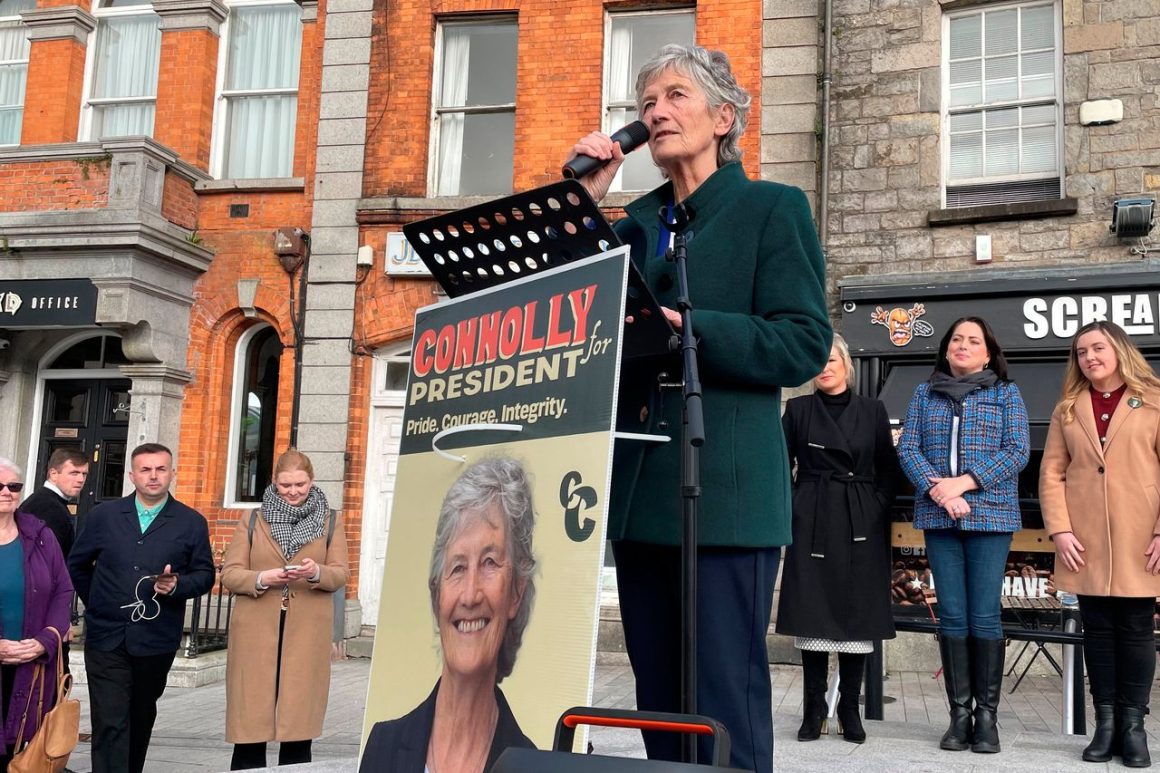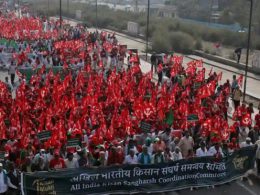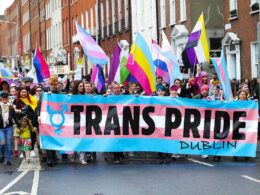By Finghín Kelly
Catherine Connolly has won the presidential election in a landslide. This is an important victory for an independent and left candidate and a humiliating blow to the Government, media and the broader establishment.
From the moment she announced her candidacy, Catherine Connolly faced an almost unprecedented, orchestrated smear campaign from the above forces. Despite these pressures, she maintained a strong stance and defended her positions – resisting pressure to water down her politics. This is to be commended.
She put solidarity with Palestine, opposition to militarisation and criticism of the neo-liberal model for housing and public services to the fore in her campaign. She stood against racist division and for the rights of disabled people and carers, and for resources for the Irish language and Irish-speaking communities. She was the only candidate to speak about the climate and ecological crises.
As such, there was particularly large support among young people for Connolly’s campaign. An Ireland Thinks poll two days before the election showed a massive 83% support among people aged 18-34. This is a strong reflection of a deep desire among a large cohort of young people for progressive and left change, as well as solidarity with Palestine.
Winning support
The campaign attracted 15,000 people to sign up, with local groups in every constituency and a presence in universities and third-level colleges. Hundreds of thousands were raised online through small donations averaging just over €30. The core of these groups were members and supporters of the various parties that supported Connolly, but it also included many people who are not politically affiliated but had often been active in the Palestine solidarity movement, campaigns on housing, repeal of the 8th amendments and LGBTQ rights.
The victory for Connolly and the extremely low vote for Heather Humphreys is a significant blow to the Fianna Fáil / Fine Gael government. It was a rejection of their meek approach to the genocide in Palestine – watering down the Occupied Territories Bill to a toothless token Bill and doing so under pressure from US big business. It is a setback to their ongoing efforts to remove the Triple Lock and to fall into step with EU militarisation and further integration with NATO. A recent study commissioned by Uplift showed the reliance by Irish capitalism on an FDI economic model dominated by US corporations has resulted in “a deep structural link with Israel making Ireland the world’s second-largest importer of Israeli goods”. The victory for Connolly is another rebuke to those economic ties which back up the apartheid, Zionist State. It is also a sign of the broader anger against FF/FG and the political establishment and the desire for change, especially amongst young people, and the potential for a left message to tap into that.
Catherine Connolly’s victory today will be seen internationally as a beacon of solidarity with the Palestinian people and against genocide. Conversely, it will be met with disgust from the talking heads of capitalism and imperialism in the “mainstream” media.
Out-of-touch political establishment
This campaign has badly damaged the credibility of Fine Gael and Fianna Fáil.
In today’s epoch of crisis capitalism, the ruling class in Ireland is incapable and unwilling to resolve the crises facing working-class people – from housing to the environment. There is also a desire on their part to align with the major Western imperialist powers in global conflicts. In this context, having a president who would speak out about injustice domestically and on issues like the Gaza genocide internationally, as Michael D Higgins increasingly did towards the end of his second term, was an inconvenience. They strongly desired a return to a president who would ‘stay in their lane’ and essentially keep to dutifully signing Bills and attending sporting events.
To this end, Fianna Fáil selected Jim Gavin – a ‘celebrity candidate’ with no political background. In his short time as a candidate, he made it clear that he would be ‘apolitical’ and would quietly always back the government. Martin had hoped to avoid a veteran Fianna Fáiler like Bertie Ahern being the candidate as this would remind the public of the rotten role Fianna Fáil played in the inflated property bubble, economic crash and austerity years.
However, it emerged that Jim Gavin did stand in that tradition after all! As a landlord he had pocketed €3,300 he received from a tenant due to a banking error. This is despite the tenant doggedly pursuing the money, even at one stage hiring a solicitor to get his money back. Micheál Martin is now badly undermined by his top-down anointment of Jim Gavin as the Fianna Fáil candidate.
Fine Gael has also had a disastrous campaign. Heather Humphreys, a veteran government minister who is very close politically to Simon Harris and presided over all of Fine Gael’s unpopular record, from austerity policies to the housing crisis. As a Minister last year, she sought to attack the rights of disabled people with a Tory-style Green Paper which proposed to force disabled people off benefits and into unsuitable work.
In the course of the campaign, she also defended austerity policies, the Government’s record on housing, its approach to the Occupied Territories Bill, and refused to make any criticism of the EU and its support for Israel and increased militarisation. She was also vocal in her support for fox hunting, which she repeatedly and spuriously described as a ‘rural pursuit’.
She was a solidly pro-government, Fine Gael candidate. However, it is also the outrageous level of smears and negative campaigning from Fine Gael and their supporters in the political and media establishment that has stood out, and left a sour taste in people’s mouths.
Disgraceful smear campaign
Slurs and smears were relentless as soon as polls emerged showing that Connolly was in the lead. Former Fine Gael Minister Ivan Yates, while musing about what advice he would give her on a podcast said “Go bullheaded, do you want a provo in the Park? Is she a Russian asset? I would smear the bejaysus out of her simply because you have nothing to lose”. This is exactly what Fine Gael implemented.
The attacks were incessant and increasingly incoherent and bizarre. Connolly was accused of being aligned to Russia, being “anti-European”, supportive of former Syrian dictator Assad, breaking security rules in the Oireachtas, of hypocrisy for her role as a barrister, and being against women’s rights. There was also an accusation that her supporters were engaged in sectarian insults. The most farcical was a criticism that in a viral video of Connolly playing basketball with children that she didn’t let the children win!
These smears were facilitated and amplified by much of the mainstream media. Aoife Moore, a journalist who worked in the Catherine Connolly campaign’s press office, exposed the links between Fine Gael and much of the media:
“During debates, Fine Gael texts out attack lines to journalists. They’re often forwarded directly on to me by colleagues in journalism and minutes later the very queries Fine Gael direct them to ask appear in the Connolly press inbox.”
The smears took place across all the main news outlets, but there were several cases that stood out. The Sunday Independent, in its edition prior to the election, carried 11 attack pieces against Catherine Connolly and no pieces favourable to her. There was also the contrast between how Humphrey’s in an RTÉ interview was asked about her pets and where she puts her toaster(!), while Catherine Connolly was grilled by the same presenter about whether she’d employ a sex offender in Áras an Uachtaráin!
These smear tactics backfired on Fine Gael. Heather Humphreys support stagnated in the polls. In the middle of the campaign, Fine Gael and Fianna Fáil support dropped to its lowest ever level in the history of opinion polls (IPSOS/B&A 14/10/25), standing at a combined vote of 35%.
The fact that they felt such smears would work, and that they increased their intensity despite them not working, shows a deep disconnect between the political establishment and the wider population. They did this because they were unable to put forward a position that would actually resonate positively with ordinary people. The smear campaign torpedoed an already doomed campaign for Fine Gael, however the damage might be longer lasting.
The far right and spoiled votes
A victory of a left candidate who took a stand against racism is an important development. The Connolly campaign showed the potential in building a progressive and principled anti-racist campaign. However, the high number of spoiled votes – while significantly lower than the votes for Connolly – is a clear warning of the ability of far-right forces to also capitalise on the anger and discontent that exists.
This followed the failure of millionaire anti-choice and anti-LGBTQ campaigner Maria Steen and a host of other right and far-right candidates to get on the ballot paper. While the nomination process for the Presidential election is clearly undemocratic and allows a lot of scope for the establishment parties to control who can enter the race, the core of the campaign for spoiled votes was organised by right-populist and far-right groups. They will be boosted by the level of spoiled votes, and will seek to capitalise on it in the period ahead.
Riots in Citywest in Dublin took place in the week of the election, where the far-right shamefully sought to exploit and weaponise the horrific sexual assault of a 10-year-old. This undoubtedly contributed to the momentum of the campaign for spoiled votes, and was yet another warning of the deeply malign influence these forces have within society, and the need to build a socialist left to counter-act them.
All this shows the urgent importance of building a clear left and socialist alternative, and of building active movements against racism, misogyny and transphobia, for housing and public services and continuing to strengthen the Palestine solidarity movement.
Opportunities for an alternative government?
The campaign and election of Connolly has opened up further discussion about the idea of an alternative government that could remove Fianna Fáil and Fine Gael from power for the first time in the State’s history. The Connolly campaign had the official endorsement of all the main opposition parties, Sinn Féin, Labour, Social Democrats, People Before Profit – Solidarity, and the Greens. This has been widely described as a ‘united left’ initiative.
In reality, while Catherine Connolly’s politics are not of the radical socialist left, she is clearly to the left of all of these parties (except People Before Profit – Solidarity) on most key issues from neutrality, to housing, to disability rights. This stood out in her willingness to be sharp in her criticism of the role of US and European imperialism in relation to Palestine and militarisation.
The election has certainly shown that the two main parties of Irish capitalism have a narrower base in society. Due to years of anti-working class policies, they were unable to win any enthusiastic support and have been progressively weakened. Their true nature was highlighted further during the campaign with a budget that saw billions being funnelled to property developers, builders and restaurant chains while putting an increased squeeze on low- and middle-income workers and public services.
There is now a strong and extremely positive desire to get these parties out of power, and see real change in government policy. Many also correctly see the potential support and enthusiasm that a strong left challenge at the next election could generate. We completely support the defeat of FF/FG, and if it’s possible, any Socialist Party TD elected in the next general election will use their votes to remove FF and FG from government.
However, removing these parties will only bring about real change if it’s linked to policies that can really transform people’s lives by ending the multiple chronic crises in Irish society, whether in health, housing, care or climate. This means breaking with the economic model of Irish capitalism – a tax haven for big business and the rich, with perennial crises for the majority of working-class people. Unfortunately, it seems that Sinn Féin, Labour, the Social Democrats and Greens are unwilling to do this. When parties such as Labour and the Greens have participated in previous governments with Fine Gael and/or Fianna Fáil, they oversaw the implementation of austerity, the housing crisis, and the continued underfunding of public services.
Making real, radical change
For real change to happen we need to turf out FF and FG, yes, but we also need to turf out their failed and rotten pro-market, pro-corporate, pro-imperialist ideology and policies. It’s crucial that socialists point this out and bring the discussion about real change forward, and not give left credentials to parties simply because they are not FF and FG.
Whether there is a clear choice or not depends on how parties like Sinn Féin, Labour, Social Democrats and the Greens plan to bring about change. Do they propose a break with pro-market policies and prioritisation of capitalist interests, i.e. real change, or do they merely propose alternative pro-market policies, i.e. minimal change? Real, radical, anti-capitalist change is necessary, and what’s more it’s possible. But what that means and how it can be brought about should be highlighted, debated and discussed, and not obscured or misrepresented by sowing illusions in political forces who have no interest in such change.
For example, to solve the housing crisis there needs to be a break with the for-profit model that prioritises the interests of private landlords and developers. Housing needs to be provided on the basis of need. We need the mass building of social and affordable housing, which will require a state construction company that will be based on the nationalisation of the major construction companies. More generally, the real change we need for both ordinary people and the environment will not be won if Ireland’s status as a tax haven remains and the key wealth and resources remain in private ownership and control.
A non-FF/FG government – even if it calls itself ‘left’ – that does not break with the logic of the market and does not take on the vested interests that profit from the status quo, will inevitably disappoint and potentially create greater space for the far right, especially if that government has been cheered on by socialists. Parties like Sinn Féin, Labour, Social Dems and the Greens should be challenged to embrace such a change and not just given a free pass.
A genuine left will also need to take a principled stand on racist division. Unfortunately, that is not what we have recently seen from Sinn Féin. Last week, they played a role in adding to anti-migrant tensions in the wake of a horrific assault against a child in Citywest, when Mary Lou McDonald in the Dáil responded to the incident by calling for a speeding up of deportations. Sinn Féin have also disgracefully attacked trans rights in the North by supporting the banning of puberty blockers.
Get active, get organised
We warmly welcome the defeat of FF and FG in this election and the opportunities that it opens up. It shows that a left candidate can defeat the two main traditional parties of Irish capitalism. We must channel that enthusiasm into a movement for anti-capitalist and socialist change, a movement that will no longer accept the unacceptable status quo of genocide, oppression, ecocide, inequality and the rule of billionaires.
The Catherine Connolly victory should give us confidence that such a movement can be built. What’s vital now is that all those enthused and uplifted by this victory, who see the real threat we now face from an increasingly organised and emboldened far right, and the need for radical change in Ireland and internationally, make the decision to get active in building genuine left and socialist forces. Join us today.












